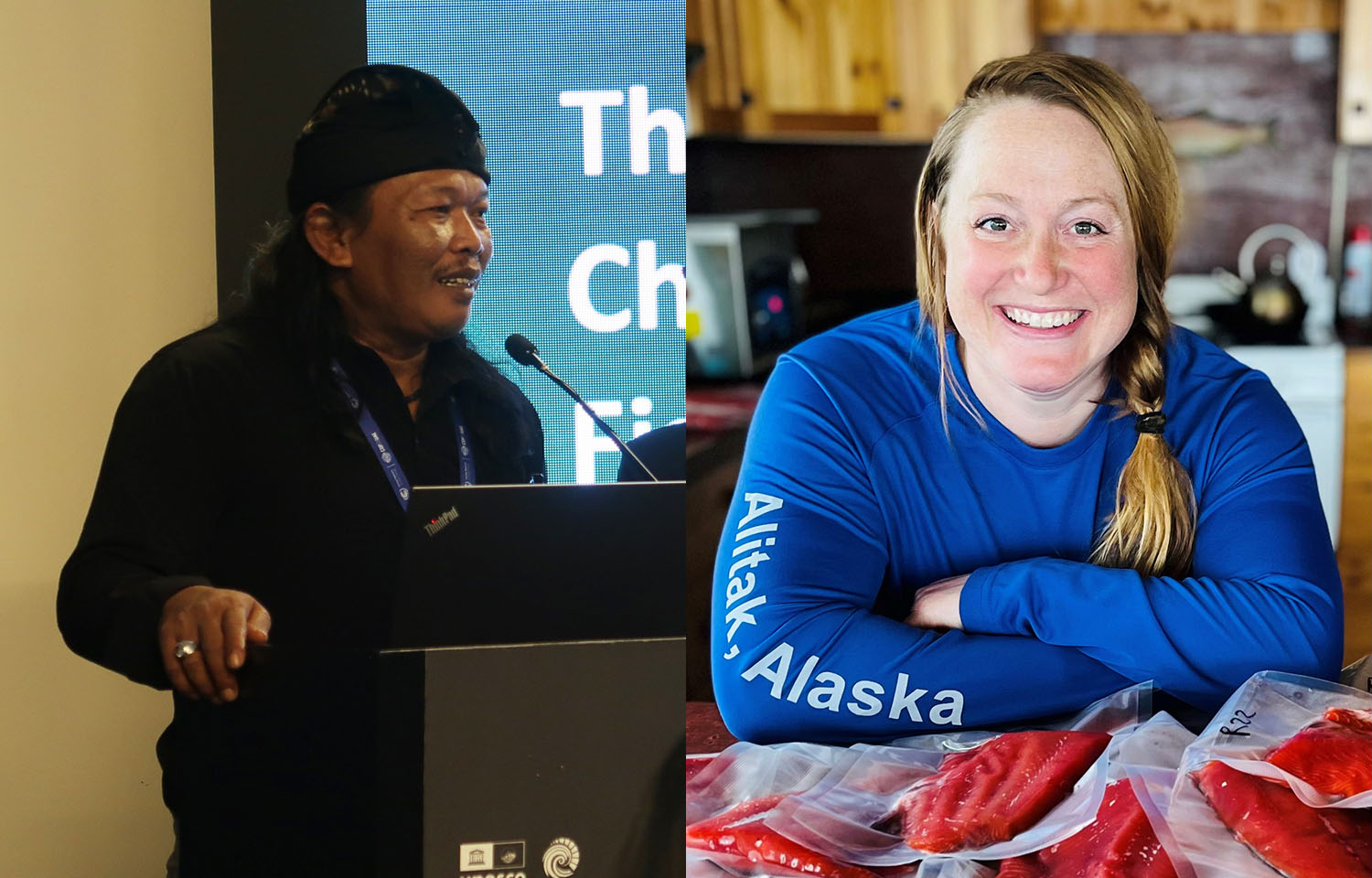Hannah Heimbuch is a fisheries policy and communications consultant for Ocean Strategies and a commercial salmon fisherman from Alaska. Pak Mustain is a blue crab harvester from Indonesia. Both work with the Walton Family Foundation to support sustainable seafood production and resilient fishing communities.
We traveled from coastlines a world apart and crossed different oceans to get there, but as fishermen, we found ourselves part of a shared story at COP28: seafood and fishing communities need to play a larger role in the United Nations Climate Conference.
Indonesia and Alaska operate in different ecosystems and socio-political realities, but our real-time climate concerns are similar – food security; equitable and sustainable management; declining and shifting stocks; and resilient fishing-dependent communities. While our individual work as harvesters is often hyper-local, fishermen understand why these concerns are global, particularly as the world considers an unprecedented scale of adaptation.
According to the World Bank, 40 percent of the world’s population lives in proximity to the coast — many of them rural, and particularly vulnerable to the impacts of climate change. Seafood is a low-carbon source of protein worldwide, and three billion people rely on it as a primary source of nutrition. Small-scale harvesters are critical to that matrix both provincially and as a global collective. But despite the role they play in human health and livelihood, fisheries broadly and small-scale harvesters especially are often an afterthought in the larger discussions around climate mitigation.
Recognizing this, our goal at COP28, hosted in Dubai in the United Arab Emirates, was to participate in food systems and resilience conversations, sharing a vision for elevating fishing communities as frontline locales impacted by climate, and fishermen as critical leaders.
Some might argue that many broad-stroke agreements and executive orders featured within and outside of COP do name ocean-food production, ocean equity, and coastal communities as priorities. While that’s increasingly true, those dialogues are lacking direct stakeholder representation, as well as parity with other climate movements amid private and public sectors increasingly competing for attention, money, influence, and outcomes. This can easily prevent well-worded agreements or orders from having a meaningful impact, and creates additional vulnerability as large-scale solutions take shape on our coasts.
It’s impossible to fully assess the world’s approach to climate and the ocean at an event that drew 97,000 people, but still, the trends are there. Marine life and coastal communities are identified as being impacted by climate, yet fisheries are leagues behind in representation and consideration within foods and sustainability discussions – at this event, as well as in climate conversations, broadly speaking.
The impact of this deficit is more than just an absence from participation and representation. It’s a risk. The failure to include fisheries representatives in broad climate conversations neglects three critical climate aspects:
● adverse impacts on ocean-based food security and coastal communities;
● the global climate benefits of increased fisheries resilience;
● and the potential harm of large-scale climate solutions that don’t fully consider seafood production and fishing-dependent people.
Seafood is one of the most-traded food commodities on the planet. So while climate impacts to fisheries resilience and how well they’re addressed will vary country to country, the significance is inevitably global. In Indonesia, the world’s second-largest seafood producer, fisheries contribute 50 percent of the nation’s protein and at least seven million jobs. Some climate projections warn of an up to 30 percent decline in catch volume by 2050, indicating potential for significant impact at home and abroad. Similar projections have emerged for nations along the West Africa coast, such as Liberia, Cote d’Ivoire, Ghana, and Gabon. In the U.S., imports make up 70 to 85 percent of the more than six billion pounds of seafood consumed annually, and fisheries contribute more than 1.7 million jobs. Meaning, the potential for domestic and global catch declines create economy and food systems stressors in the U.S. from multiple angles.
While fisheries are not often in the spotlight, oceans are. Most recently, they’ve begun to play what some would call an outsized role in carbon mitigation hopes, as leaders consider wide-ranging approaches to carbon sequestration and geoengineered climate solutions. The ocean as a carbon sink, a source for renewable energy, and a target for gains in the wider conservation movement needs to be actually balanced with and directly informed by its role in nutrition, livelihood, culture and the complex well-being of ocean-dependent communities.
The world does need clean renewable energy, carbon mitigation, and biodiversity conservation, and the ocean is central to our success. But little of that success will endure if robust and equitable ocean food systems and seafood livelihoods are overshadowed in strategy and substance by other aspects of that development. Climate crisis is a battle at scale – at times local, at times global, and it can create tension between the two. Fishing communities acutely familiar with that tension can help ensure that ocean solutions are comprehensively sustainable, rather than allowing the ocean to become climate’s fabled golden parachute, creating the world’s single largest case of “not in my backyard” development, and a suite of other problems.
The COP ideals of equity, resilience, and sustainability are worthy, and will approach functional reality when working in integrated partnership with the people actively engaged in harvesting and processing the planet’s food. This is as much true for the ocean as it is for our terrestrial landscapes. At least in theory, most leaders and advocates know this, but it takes stakeholder engagement at every level to achieve it. Without that, history tells us, we will fall short.
Fortunately, there is capacity and place for that leadership and participation. There are fishing-dependent communities on every continent with representatives qualified to bring their perspectives to the United Nations. In doing so, they will enrich and empower the pathway to food carbon reduction, food security, frontline community resilience, sustainable energy production, biodiversity, conservation, and climate justice.
Photos courtesy of Walton Family Foundation






